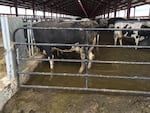
Environmental and rural advocacy groups say photos taken at Lost Valley Farm show the farm poses animal welfare problems and raise potential water quality concerns.
Photo courtesy of the Animal Legal Defense Fund
State lawmakers will once again consider a moratorium on mega-dairies after the spectacular failure of a 30,000-cow operation in Eastern Oregon.
A coalition of environmental and animal welfare groups backing the proposal argues mega-dairies should be regulated like other heavy industry and that, until they are, Oregon should stop permitting them.
“I think that if mega-dairies had to comply with the environmental laws that all the other industries have to, they would not be as economically feasible as they are now,” said Amy van Saun, a senior attorney at the Center for Food Safety’s Portland office.
Meat and dairy occupy an increasingly controversial position in the American diet.
The proliferation of mega-dairies has contributed to the downfall of small- and mid-sized dairy farms worldwide. Dairy remains a billion-dollar industry in Oregon.
Livestock and their methane-y burps account for nearly one-sixth of global greenhouse gas emissions. Pollution from livestock facilities also poses significant public health risks. However, agriculture isn’t regulated to the same degree as, say, oil and gas or manufacturing.
“It’s really dependent on a lot of crutches to exist,” van Saun said. “Some of that is subsidy … some of that is exemption from regulations.”
The legislation would temporarily prohibit the state departments of Agriculture and Environmental Quality from issuing or renewing licenses or permits to new dairies seeking to keep 2,500 cows or more. The moratorium would also apply to existing dairies seeking to expand to that size.
It would require Oregon to study mega-dairies’ effects on air, water, public health, animal welfare and the dairy industry itself and to develop laws addressing those impacts.
This is the second attempt at a mega-dairy moratorium in Oregon since the notorious Lost Valley Farms dairy in Boardman crashed and burned almost immediately after it opened in 2017, piling up more than 200 environmental violations in a year and a half.
“Honestly, they gave us a black eye,” said Tami Kerr, executive director of the Oregon Dairy Farmers Association.
Lost Valley was the second-largest dairy in Oregon, permitted to keep up to 30,000 cows. The state allowed Lost Valley to open before construction was complete, and the dairy cows produced more poop than the farm could handle. The dairy also lacked key animal safety measures like a dedicated place to treat sick cows, a nursery for calves or even proper feed storage.
The Oregon Department of Agriculture revoked Lost Valley’s permit in 2018 and the dairy folded soon thereafter. Kerr said Oregon’s dairy community has since tried to turn the page.
“All of our dairy farmers wanted to see that farm shut down,” she said. “We do not want to see something like that happen again.”
The state’s new permits for concentrated animal feeding operations, or CAFOs, will include additional inspections aimed at preventing many of the issues at Lost Valley. Kerr said these inspections combined with monitoring, review and public involvement in permitting decisions already give Oregon some of the most stringent regulations in the country.
“If you are in compliance with all of your permits, then you have right-to-farm protection,” Kerr said. “This bill would take that away, and that’s very problematic.”
She added that dairies need room to grow to keep up with rising costs.
“Right now, it would be extremely difficult — impossible — to milk 50 cows and to stay in business,” Kerr said.
The Center for Food Safety’s van Saun says the state should not treat the failed Lost Valley dairy as an anomaly.
“Lost Valley was one egregious example of what can happen when these large facilities go wrong,” she said.
The bills, sponsored by Sen. Michael Dembrow, D-Portland, in the Senate and Rep. Rob Nosse, D-Portland, in the House come as new owners try to revive the Lost Valley site.
Pasco, Washington-based Easterday Farms, which specializes in onions and potatoes, intends to reopen the dairy with up to about 28,000 cows. Owner Cody Easterday did not reply to OPB’s request for comment.
Editors note: This story has been updated with a photo from a dairy discussed in the story, replacing the file photo that we originally used.

